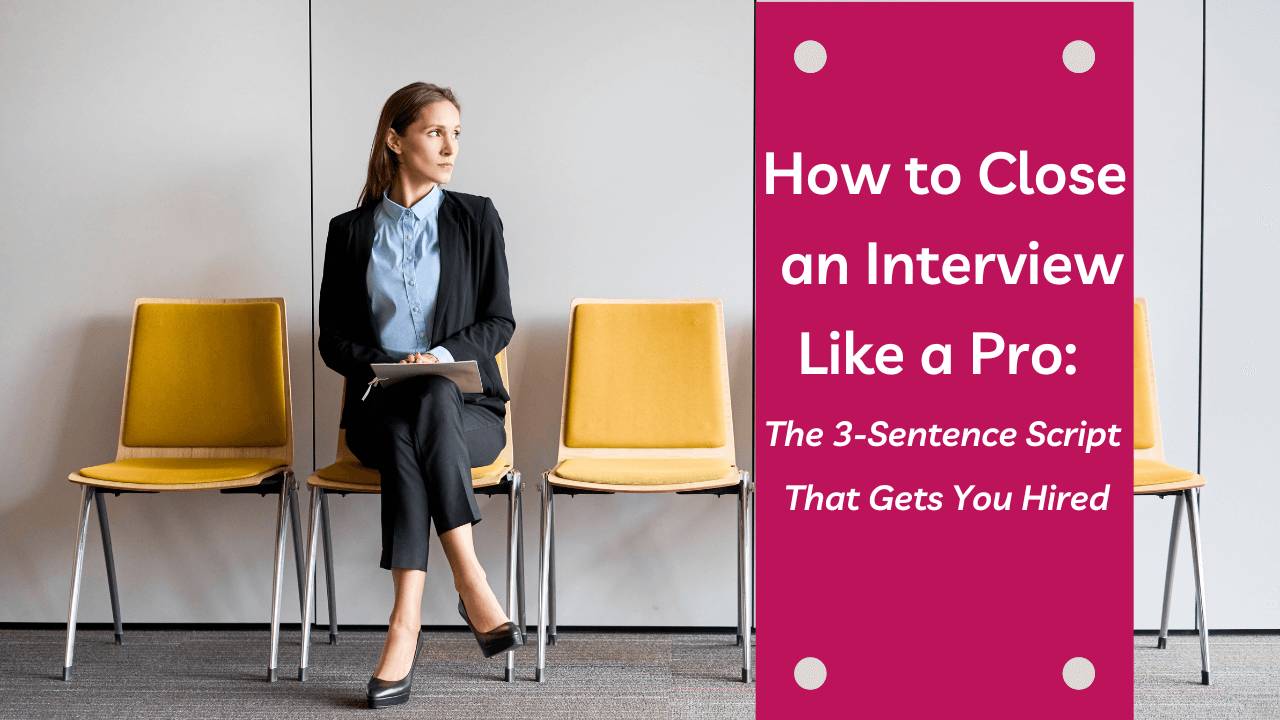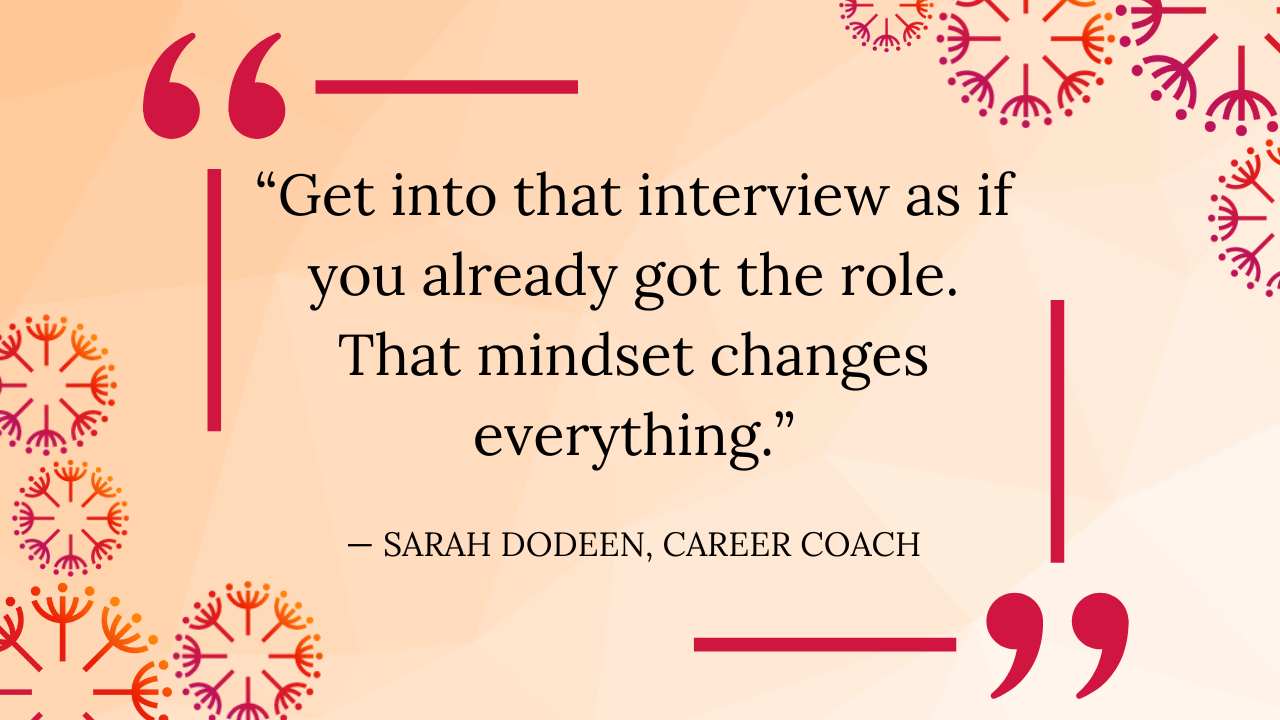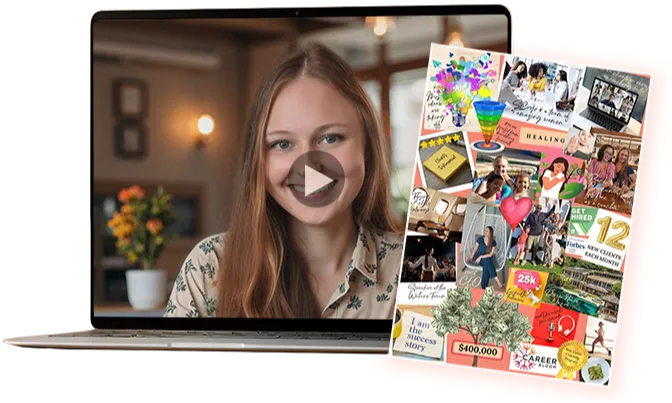
You know that moment at the end of an interview where they go, “So… do you have any other questions for us?”
And your brain’s like, “Nope, I’m just trying not to pass out, actually.”
Yeah. That’s the moment most people blow it.
But not you. Not after this.
Because that’s not just the end of the interview. That’s your closing scene. Your final line. The moment you get to plant one last thought in their brain before they go back to their inbox and forget 90% of what just happened.
And that one moment? It’s what decides whether they walk away thinking, “Hmm, she was nice,” or “Holy sht, we need her.”*
So we’re not doing “thank you for your time.” We’re doing drop the mic, leave them stunned, casually walk out like Beyoncé leaving a boardroom.
Here’s how you’re going to do it. It’s one simple, three-sentence close that changes everything.
🎧 Prefer to listen? Interview Red Flags That INSTANTLY Disqualify You
Why the Way How You End an Interview Matters Most
We’ve all heard the saying, “You never get a second chance to make a first impression.” And yes, that’s true.
But here’s what people forget: your last impression can hit even harder.
People remember how you made them feel at the end far more than they remember your perfectly rehearsed answer from ten minutes in.
As I often remind my clients, the first question and the last one in an interview are the most powerful. The first sets the stage. The last seals the deal.
Why? Because our brains are wired to hold on to beginnings and endings. Think about your favorite movie. You might forget the scenes in the middle, but you can quote the opening line and still feel the ending in your gut. Interviews work the same way.

The Psychology of the “Mic Drop” Moment to Close an Interview Strong
Sarah Dodeen, a fellow career coach and expert in confident communication, put it perfectly when we talked on my podcast.
“It can be a simple drop-the-mic moment. You make a statement that everyone listens to, then you stop. You sum up exactly what they’re looking for and confirm, with confidence, that you have those skills and can deliver value. You’re vocalizing what they can expect from you in one clear moment.”
That moment works because it organizes everything they’ve just learned about you. Instead of hoping they remember your best points, you guide them straight to the takeaway: I’m the one who can solve this problem.
The right words, said with calm certainty, create clarity. And clarity reads as confidence.
That’s the psychology behind a strong close. You connect the dots for them and make it easy to choose you.
The Mindset Shift That Changes Everything
If you remember one thing from this entire post, make it this: walk into your interview like you already have the job.
It sounds simple, but it’s a total game changer.
When we talked on my podcast, Sarah Dodeen told me she teaches this to every client. It changes everything about how you show up, how you speak, and how you’re perceived. You stop trying to prove you’re good enough and start talking like someone who’s already part of the team.
When you believe it’s already yours, your whole energy shifts. You sound steady instead of desperate. You listen more, smile more, and speak with intention. You start sentences with “Here’s what I’d focus on first” instead of “I think I could maybe help with…”
That confidence is magnetic. It tells the hiring manager, this person gets it.
So before your next interview, take a deep breath and remind yourself, “I’ve got the role. I’m just here to talk strategy.”
That mindset alone can change everything.

What Closing With Impact Sounds Like
Now let’s see what that “already got the role” mindset actually sounds like in the room.
Sarah Dodeen shared a great example during our conversation:
“I know you’re looking for someone who can drive both relationship building and long-term strategy in this sector. I’ve done that consistently, whether it was working with high-value partners, growing portfolios, or collaborating with leadership to align strategies. I’m excited about bringing that same impact to your team and expanding that work even further. So tell me, what are the next steps?”
This kind of close lands because it checks every box:
- It mirrors back exactly what the employer is seeking.
- It cites proof of past success.
- It communicates excitement and forward momentum.
- It ends with confidence by asking about next steps.
See what’s happening there? It doesn’t sound like a pitch. It sounds like a teammate outlining what’s next. The tone is calm, confident, and future-focused.
That’s the secret. Believe you already have it, and your words will follow.

Using the “Any Questions?” Moment to Shine
Almost every interview ends with some version of: “Do you have any questions for us?”
This is it. Your last chance to show you’re not just prepared, but genuinely interested.
Too often, candidates panic and say, “No, I think I’m good,” which is basically interview code for “I didn’t do my homework.” Don’t be that person.
Instead, use this moment to show curiosity. Show strategy. Show that you’re already thinking like part of the team.
I recommend you ask 3 thoughtful questions that show you’re genuinely invested:
- “What are the priorities for this role in the first six months?”
- “What traits do your most successful employees share?”
- “How does this team collaborate across departments?”
Once you’ve had that conversation, don’t just say thanks and walk away. Use it to glide into your final close.
Something like:
“No more questions at this point, thank you so much for the insights you’ve shared. What I want to leave you with is this: I’m confident I’m the right person to help you solve [the problem this role exists to solve].”
My Framework for Preparing Insightful Questions
Asking the right questions during an interview is just as important as answering them. They show you’re engaged, thoughtful, and serious about understanding how you can make an impact.
But not every stage of the process calls for the same type of question. Here’s how to tailor them:
A. Early-Stage Interviews
- Clarify Role Expectations
“What does a typical day look like in this role?”
Shows you want to understand fit. - Explore Growth Opportunities
“What opportunities for professional development does the company offer?”
Signals you’re invested in the long term.
B. Mid-Stage Interviews
- Dive Into Strategy and Challenges
“How does this role support the company’s strategic initiatives, and what challenges might I face?”
Positions you as a problem-solver. - Discuss Team and Collaboration
“How does the team I’ll be working with interact with other departments?”
Demonstrates you’re already thinking about collaboration.
C. Final Interviews
- Confirm Cultural Fit
“What traits do successful employees here share?”
Ensures alignment of values and style. - Clarify Next Steps
“What are the next steps in the hiring process, and when can I expect to hear back?”
Shows your proactive interest.
Once your questions have sparked a real conversation, close with purpose. You’ve shown curiosity, now show conviction.

Your 3-Sentence Template for How to Close an Interview
Here’s a simple three-sentence template you can adapt. It always ends with “What I want to leave you with…” which is your final moment to make it stick.
- Thank the interviewer.
“Thank you so much for sharing more about this role and the team today.” - Express enthusiasm.
“I’m even more excited now about the opportunity to contribute at [Company Name].” - Reinforce why you’re the solution.
“What I want to leave you with is this: I am confident I can help you [solve X problem or achieve Y goal], because of [your most relevant skills/experience].”
That’s your close. Three lines that say exactly what they need to hear. Clear, confident, and easy to remember.
The Role of Executive Presence
Closing strong isn’t just about what you say. It’s how you say it.
Executive presence isn’t some mysterious “leader energy” people are born with. It’s the mix of calm, confidence, and connection that makes people want to listen when you speak.
As Sarah Dodeen put it, “It shows up before you even speak. It’s how you hold yourself, how you pause so people listen, how you use tone, and how you maintain eye contact, even virtually by looking into the camera.”
The good news? You can build it. Record yourself on video before your next interview. Watch it back, even if it makes you cringe a little. Notice your body language, your tone, and your pacing. Those small adjustments make a big difference.
It might feel awkward at first, but it’s one of the fastest ways to refine your delivery.
Common Mistakes to Avoid
Let’s talk about what not to do at the end of an interview. These are the small slip-ups that can quietly undo all your great answers.
- Saying you have no questions.
It comes off like you’re not curious or invested. Even one thoughtful question shows you’ve done your homework and care about the role. - Making it all about you.
Saying things like “I really want this job because the benefits are great” misses the point. It’s not about what you’ll get, it’s about what you’ll bring. - Speaking negatively about past employers.
Even if every word is true, it creates doubt. Keep it professional and future-focused instead. - Forgetting to actually close.
Don’t just trail off with “That’s all I have.” End with intention. Use your closing line to remind them exactly why you’re the right fit.
Avoiding these mistakes keeps your final impression strong, steady, and confident, the kind that sticks long after you leave the room.

How to End an Interview With Confidence (And Get Remembered for It)
Imagine you’re at the end of your final interview. You’ve built great rapport, answered every question, and now they ask, “Any final questions?”
This is your moment to land the plane with calm confidence.
Here’s how it might sound:
“Yes, thank you. I’d love to hear what success in this role looks like after the first year.”
[Pause for their answer.]
“Thank you for sharing that, it’s really helpful. I don’t have any more questions at this point, but what I want to leave you with is this: I know you’re looking for someone who can build strong client relationships and deliver on long-term strategy. That’s exactly what I’ve done in my last two roles, and I’m excited about bringing that same impact here. I look forward to the next steps.”
Now take a second and imagine delivering that. You’re calm, grounded, and already talking like part of the team.
So before your next interview, I want you to practice that close out loud. Let it feel natural. Let it feel like you.
Because when you believe the role is already yours, something shifts. You stop chasing. You start owning.
So believe in yourself. The role’s already yours.
About Career Coach & Author
Theresa White, Career Clarity Expert, 5x Certified Career Coach, and the Founder of Career Bloom, is known for her expertise in guiding people to get unstuck and find the direction they need to move forward in their careers—fast. In a time when so many people are re-evaluating their work, Theresa offers actionable insights that empower clients to identify their true strengths and pursue work that genuinely aligns with their goals.
Theresa’s clients often call her sessions “epiphanies” and “transformational.” She brings immediate clarity to career goals, helping people unlock a deep understanding of what makes work fulfilling for them. Past participants consistently describe her approach as “spot on” and an “answer to questions they’d been asking for weeks.”
Theresa’s approach is empathetic yet practical, and she’s known for empowering clients with a clear direction in as little as 30 days, guaranteeing results.
Connect with Theresa on LinkedIn, listen to the Career Clarity Unlocked Podcast, or schedule your free 30-minute career clarity consultation.

FAQ: How to Close an Interview
Is it a red flag if the interviewer doesn’t ask if I have questions?
Not always. Some interviews run short on time, or the interviewer may think they’ve already covered everything. If it happens, take the lead, thank them for the conversation and ask if you can share a few questions before wrapping up. It shows initiative and professionalism.
Should I send a thank-you note after the interview?
Absolutely. A thoughtful thank-you note reinforces your enthusiasm and helps you stand out. Keep it brief, reference something specific from the interview, and end with confidence about next steps.
What’s the best way to reach out to recruiters?
Start with a clear, confident message that shows value right away. The right wording can open doors before you ever hit “apply.” If you’re not sure what to say, grab my 17 Fill-in-the-Blank Message Templates, they’ll help you reach out to recruiters and hiring teams the right way (and actually get a reply).
Related Reads + Freebies
Subscribe now to never miss the latest blog!
Every Thursday, we cover an important topic, actionable advice, and inspiring content to help you find work that makes you feel like *pinch me* I'm getting paid to do this???
We hate SPAM. We will never sell your information, for any reason.




